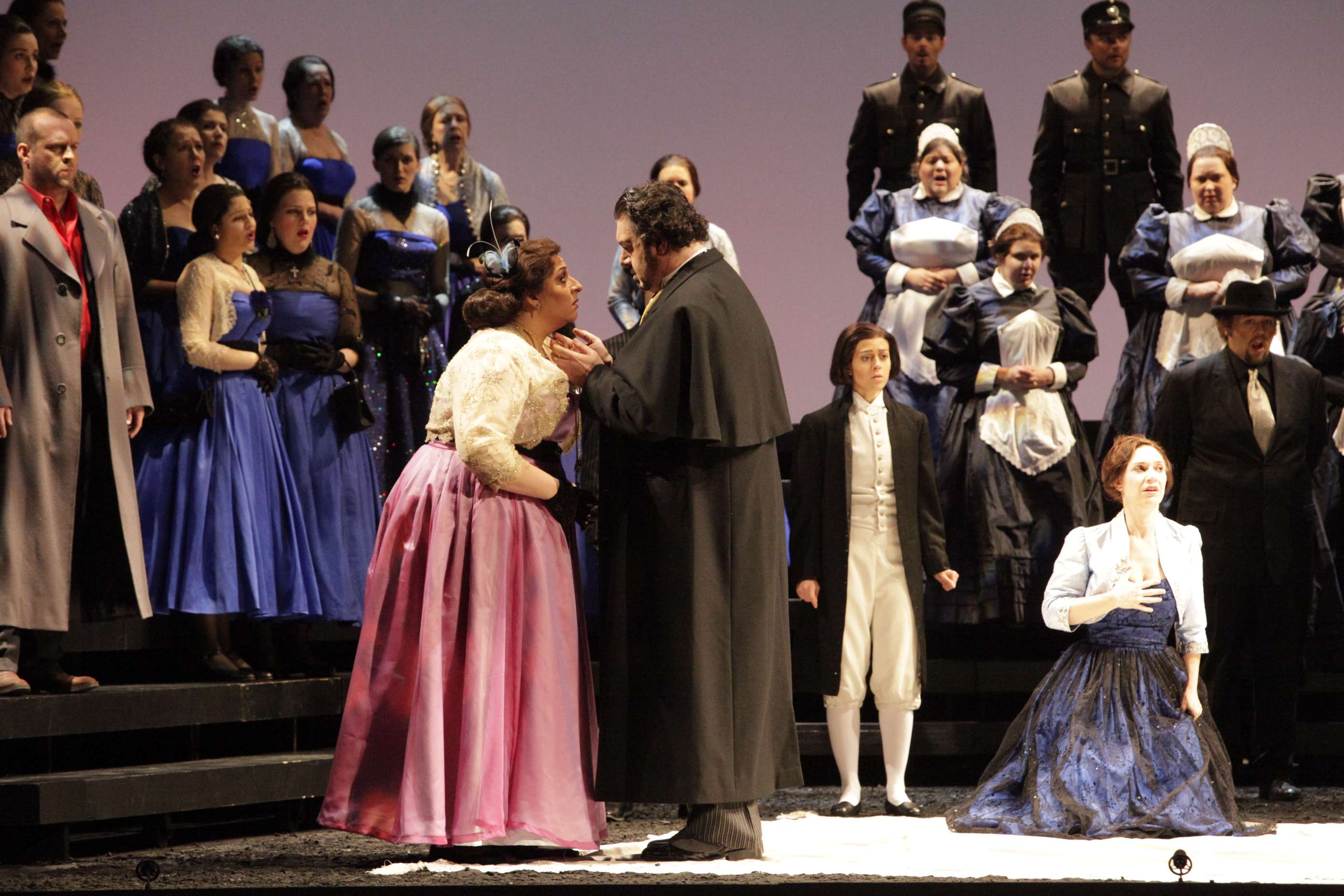|
Back
Overcoming the Epic Houston
Brown Theater, Wortham Theater Center
04/13/2012 - and April 15, 19*, 22, 28, 2012
Giuseppe Verdi: Don Carlos
Mark Diamond (A Forester), Tamara Wilson (Elisabeth de Valois), Brandon Jovanovich (Don Carlos), Lauren Shouffer (Thibault), Boris Dyakov (Count Lerme), Oren Gradus (Spirit of Charles V), Scott Hendricks (Rodrigue), Christine Goerke (Princess Eboli), Andrea Silvestrelli (Philippe II), Scott Quinn (Royal Herald), Brittany Wheeler (A Celestial Voice), Samuel Ramey (Grand Inquisitor), Judith Irvington (Countess Aremberg)
Houston Grand Opera Orchestra and Chorus, Patrick Summers (conductor)
John Caird (Director), Johan Engels (Set Designer), Carl Friedrich Oberle (Costume Designer), Nigel Levings (Lighting Designer)

C. Goerke, A. Silvestrelli (© Felix Sanchez)
In this year's six-opera season, Houston Grand Opera conquers two contrasting Verdi masterpieces. February's stupendous La Traviata thrilled in its consistently fine cast and capitalized on the tautness of Verdi's creation. The current production of Don Carlos, a much more unwieldy beast, especially in its lengthy French version, contains a good amount of fine singing, staging and orchestral playing but, in the end, fails to overcome the difficulties of pacing presented by the opera.
The production, which originated at Welsh National Opera, features in its stage design red crosses interpreted literally and figuratively. Director John Caird makes sure to emphasize that the opera is a reflection on the corruption of the Spanish Inquisition at all points, a perspective likely shared by Verdi. The sets are consistently shadowy, with bright red used in lighting and stage props when violence haunts the action. Caird has conquered at HGO before, with imaginative and effective direction of the company's 2009 world premiere of André Previn's Brief Encounter and 2010's Tosca. Don Carlos runs smoothly from scene to scene, with imaginative reinterpretations of a horseshoe stage framing the action. Costumes and set pieces are mostly period-accurate, the notable and lamentable exception being the inclusion of guns in Act III. Perhaps this was a nod to HGO's seeming addiction to having firearms on stage at any moment possible, though thankfully they weren't as ubiquitous here as in this season's Fidelio.
Vocally, there are some extreme high points and a few disappointments. The highlight of the show is Christine Goerke, capitalizing on Verdi's thorough etching of Princess Eboni, a captivating, venomous villainess. This is an extremely demanding role, but no technical challenge seemed to hinder Goerke's singing. She blended beautifully in duets and, in the thrilling action of Act III, turned the giddy schoolgirl voice of Act II into a poisonous dart, sharpening her tone and adding extra spittle to her exaggerated diction.
Goerke's dominance threatens to overshadow Tamara Wilson's fine singing as Elisabeth. This is mostly due to the subtlety of Wilson's characterization, which embraces shading of character and vocal restraint, a perfect reflection of her character's vulnerability. The range of her character is impressively shown in her Act IV confrontations with both Goerke and Silverstrelli, where we finally see and hear fiery conviction in her stance, eyes and voice. In smaller female roles, Lauren Shouffer is in fine voice as Thibault and Brittany Wheeler's "celestial voice" floats nicely (if a bit too closely) in her brief moment in the spotlight.
The success of the male casting is more variable. Brandon Jovanovich, making his role debut as Don Carlos, starts off shakily. In "Je l'ai vie, et dans son sourire," the voice things above the staff. This problem disappeared almost immediately, though, and by the time he was joined by Scott Hendricks for their Act II duet, a stentorian voice arrived. Act I seemed a bit like a warmup, which is an odd strategy, since Carlos' first aria, with its haunting recitative with clarinet, can be one of the most entrancing moments in the opera. The remainder of Jovanovich's performance revealed a few more moments of strain above the staff, but for the most part the singing was impressive, as was the development of his character.
I found Andrea Silvestrelli's Phillippe one-dimensional. He has a mammoth, impressively deep bass voice, but the singing is always loud and never retreats to a whisper in the more intimate moments that Verdi gives the character. This was even more noticeable when Goerke consistently produced a wide array of vocal shadings, perfectly matching her devious character's wretchedness and regrets. We got plenty of the former from Silvestrelli, but precious little of the latter. Veteran Samuel Ramey was perfectly cast as the Grand Inquisitor, the shakiness in soft singing sounding aptly eery and the power in loud singing impressive.
The HGO chorus and orchestra are impressive throughout. The ensemble work in Act I is held together expertly by Patrick Summers, and the many imaginative and forward-looking touches in Verdi's scoring were underscored by his players. Notable solos came from principal clarinet, haunting Carlos' thoughts in Act I, and solo cello, underpinning Philippe's agonizing aria of demise in Act IV.
This five-act French version of the opera lacks the overall dramatic thrust of the tauter four-act version, but one must commend HGO for tackling the epic. If every detail in the piece is not convincing, the overall production certainly is.
Marcus Karl Maroney
|